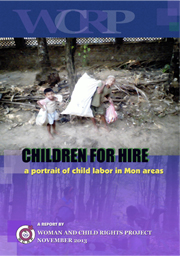WCRP releases “Children for Hire” to mark Universal Children’s Day
November 20, 2013
The Woman and Child Rights Project (WCRP) has released its report, “Children for Hire: A portrait of child labor in Mon areas,” to illustrate the incidence of child labor in rural Mon communities and along Burma’s eastern border. Drawn from 67 interviews conducted with working children and their families, health workers, public sector and civil society members, and child protection officers, the report aims to elevate the voices of underage workers and expose the less visible forms of child labor that exist outside of urban settings. Download full report HERE.
 Interviews with children and parents revealed child labor to be symptomatic of cycles of poverty fueled by poor access to education and healthcare, landlessness, migration, and the effects of decades of armed conflict and human rights abuses. Children, and particularly young girls, were also subject to social and gender norms that contributed to their entry into the workforce. The reduced likelihood that working children will complete their education and the increased risks associated with labor performed during children’s early developmental stages were found to feed directly back in to this cycle.
Interviews with children and parents revealed child labor to be symptomatic of cycles of poverty fueled by poor access to education and healthcare, landlessness, migration, and the effects of decades of armed conflict and human rights abuses. Children, and particularly young girls, were also subject to social and gender norms that contributed to their entry into the workforce. The reduced likelihood that working children will complete their education and the increased risks associated with labor performed during children’s early developmental stages were found to feed directly back in to this cycle.
“As a Mon community-based organization, it was important to see and verify that there are significant amounts of child labor in Mon areas,” said Mi Sautajo, the Project Manager for WCRP. “We found that many of our children are trapped in struggles with poverty and hard labor. Children are not accessing their fundamental rights like adequate food, basic healthcare, and education that were granted to them when the Burmese government ratified the Convention on the Rights of the Child in 1991. Although there are some services helping poor and migrant children, there are still not enough activities when compared against the amount of child labor we have.”
Data collection found particular prevalence of child labor in agricultural practices, namely on rubber plantations and betel nut farms, as well as in furniture factories and small restaurants or shops. Children were also engaged as day laborers, piecing together daily wages by clearing weeds on plantations, collecting plastic recyclables to redeem, and working as cowhands or woodcutters.
“If I didn’t work one day, I wouldn’t eat that day, so there are no holidays for me,” said one 11-year-old boy interviewed for the report who works in a factory near the Thai-Burma border. “I have to work because my family would not have enough food without my income. I would like to join school like the other children. I want to play like them.”
Since 2000 WCRP has promoted and protected the rights of women and children in Mon areas and the southern part of Burma in accordance with the Convention on the Elimination of All Forms of Discrimination against Women (CEDAW) and the Convention on the Rights of the Child (CRC). WCRP believes that through documentation, advocacy, capacity building, campaigning, community training, workshops, and education, change can be realized.
For more information, please contact:
Mi Htaw Chan, Project Coordinator, Mobile Phone: + 66 90 446 4437
Mi Sauhtajo, Project Manager, Mobile Phone: + 66 82 113 1715
Hard copies of the report can be obtained by emailing wcrpcontact@yahoo.com.
Comments
Got something to say?
You must be logged in to post a comment.



















































